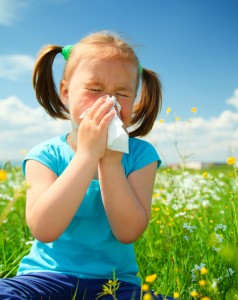Spring Allergy Season Is Here
Spring is a wonderful time of year in Georgia. It signals longer days, the end of cold weather, and an array of colorful flowering trees and shrubs. Unfortunately, spring also means allergy season for many people. Warm weather and growing plants indicate the beginning of itchy eyes, runny noses, sneezing, coughing, and other symptoms commonly associated with hay fever and allergies.
 Pollen is the biggest trigger for allergies. Tiny grains of pollen are released into the air by trees, grasses, weeds, and flowers. Pollen is produced by trees like oak, pine, poplar, maple, and hickory as well as grasses including fescue, Bermuda, and rye. The wind blows the pollen around and it settles on outdoor surfaces including cars, decks, porches, and walkways. It gets carried into our houses on shoes, clothing, and even our pets. Our bodies produce antibodies called histamines to attack these allergens, and the histamines trigger all the unpleasant symptoms allergy sufferers commonly experience.
Pollen is the biggest trigger for allergies. Tiny grains of pollen are released into the air by trees, grasses, weeds, and flowers. Pollen is produced by trees like oak, pine, poplar, maple, and hickory as well as grasses including fescue, Bermuda, and rye. The wind blows the pollen around and it settles on outdoor surfaces including cars, decks, porches, and walkways. It gets carried into our houses on shoes, clothing, and even our pets. Our bodies produce antibodies called histamines to attack these allergens, and the histamines trigger all the unpleasant symptoms allergy sufferers commonly experience.
To help reduce allergy symptoms, keep windows closed during peak pollen season. Change the filters on the HVAC system and vacuum carpets frequently. A vacuum with a HEPA filter can remove most pollen particles. Bathe and wash hair after extended time spent outside. Stay indoors on days when the pollen count is high.
Many over-the-counter medications can help relieve allergy symptoms. Antihistamines can reduce sneezing and a runny nose. Decongestants will relieve congestion but should not be taken by individuals with high blood pressure or an enlarged prostate. Eye drops may flush pollen and relieve red, itchy eyes. Saline nasal sprays will moisten nasal passages. Asthma sufferers may need to keep a bronchodilator on hand.
If seasonal allergies are making your life miserable, it may be time to see your health care provider. Schedule an appointment with your doctor if your allergies seem more severe than in previous years. If the usual non-prescription medicines are no longer controlling symptoms, a doctor can prescribe stronger medication. Anyone experiencing chest tightness and breathing difficulties should see a doctor immediately.




